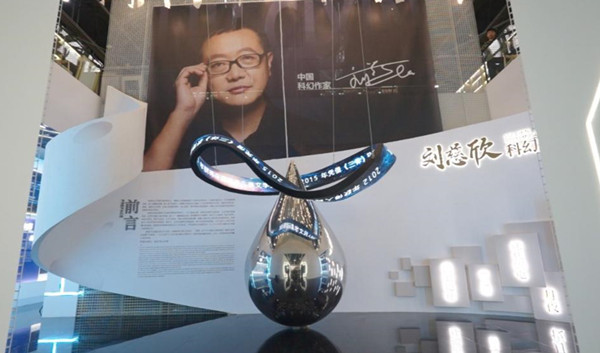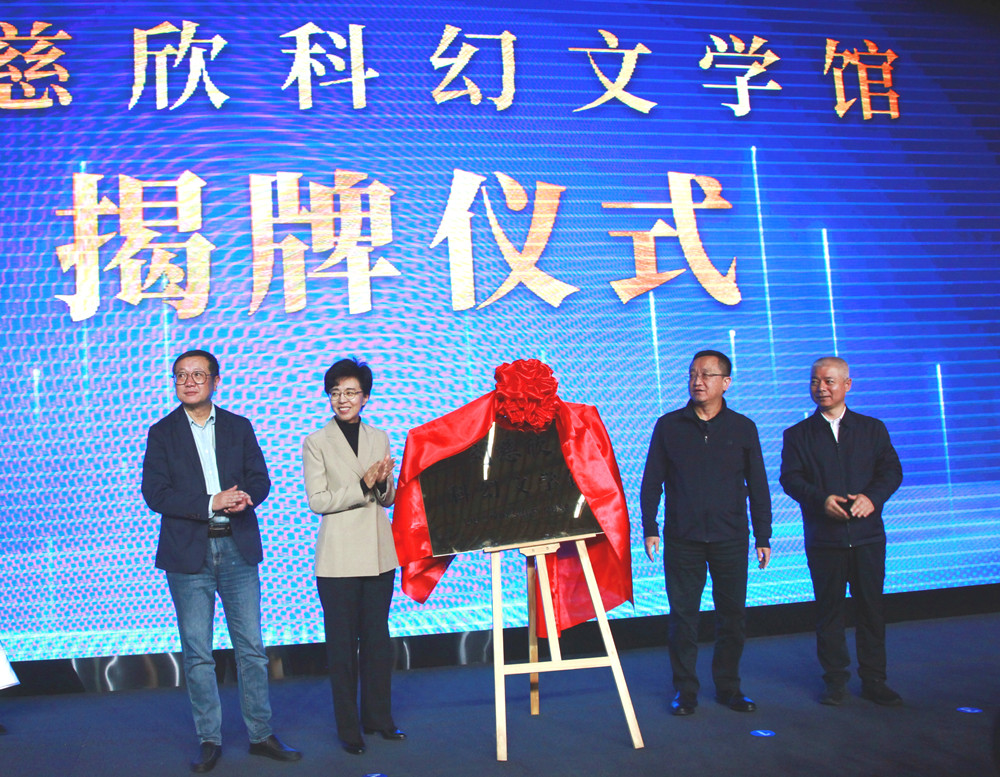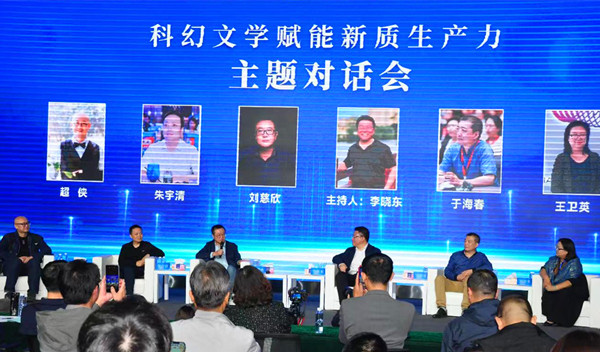
 0 Comment(s)
0 Comment(s) Print
Print E-mail China.org.cn, October 15, 2024
E-mail China.org.cn, October 15, 2024
An opening ceremony for a museum dedicated to the established sci-fi writer Liu Cixin was part of the first-day activities for the second Liu Cixin Hometown Science Fiction Culture Week in Yangquan, Shanxi province.

A photo captures the Liu Cixin Sci-Fi Museum. [Photo/Xinhua]
Held from Oct. 13 to Oct.16 and in the writer's hometown, the four-day cultural event includes an array of activities and events such as writers presenting lectures at local schools, a sci-fi and popular science writers' symposium, a sci-fi literature writing contest, sci-fi artwork exhibitions as well as the opening ceremony for the Liu Cixin Sci-Fi Museum.
The museum chronicles the award-winning writer's life and growth, showcases his creative journey and literary achievements, and spotlights the various adaptations his literary works have received since their initial publications. Liu has penned seven novels and over 40 short stories and novellas, including "The Three-Body Problem" and "The Wandering Earth," in Yangquan.
During the ceremony, Liu expressed his hope that the museum, the first sci-fi museum focusing on a single sci-fi writer in China, would spark the public's interest in science fiction literature, saying: "I hope that science fiction can bring readers more joy and awe, allowing them to touch the stars with their imaginations and embrace the future."
According to the 2024 China Science Fiction Industry Report, the total revenue of China's sci-fi industry reached 113.29 billion yuan ($15.94 billion) in 2023, exceeding 100 billion yuan for the first time. A part of this is from adaptations of Liu's works, with "The Wandering Earth" movies grossing billions of yuan in China's film market and his Hugo Award-winning novel "The Three-Body Problem" generating influence and contributing to various industries' profits.
However, Liu remained sober in his assessment: "Sci-fi literature has moved from a marginal existence into the spotlight in China, but the current state of this genre is not as flourishing as people might imagine. The popularity of 'The Three-Body Problem' was somewhat by chance; Chinese sci-fi literature still needs further, greater development."

Liu Cixin (left) announces with local and literature officials the grand opening of the Liu Cixin Sci-Fi Museum in Yangquan, Shanxi province, Oct. 13, 2024. [Photo courtesy of Yangquan Federation of Literary and Art Circles]
Besides the museum's opening ceremony on Oct. 13, Liu also attended other activities, such as a panel discussion where he stated that he greatly admires Elon Musk, whose spacecraft manufacturing company SpaceX successfully launched a test flight of Starship on the same day.
Back in September, Musk, the founder and CEO of SpaceX, announced on X, formerly known as Twitter and now owned by Musk, that the Starship mega-rocket would begin missions to Mars in two years, launching uncrewed flights to test the safeness of landings. If successful, crewed missions would follow within four years. Musk also stated that flight frequency would then be increased exponentially, aiming to build a self-sustaining city on Mars within 20 years.
"Although the Mars colonization project may face many difficulties, I still hope he can succeed," Liu said. When asked whether he would be willing to move to Mars, Liu laughed, responding that: "If it's a round trip, I would be very willing to go, but if it's a one-way trip, then it would be very difficult for me. I still have a lot of work to do on Earth, and there's also my family."
Besides looking at how to inhabit the Red Planet, Musk's business endeavors have also started speculating about technological advancements on the Earth. On Oct. 10, at the Tesla Cybercab robotaxi event, Musk, who is also the CEO of Tesla, shared his vision of a future filled with self-driving cars without steering wheels, parking lots transformed into parks and robots walking among humans.
"Musk is like someone who has jumped out of a science fiction novel, turning many things from our science fiction novels into reality," Liu remarked during the panel discussion.

Sci-fi writers Chao Xia, Zhu Yuqing and Liu Cixin (left to right) participated on a panel to discuss the theme of "Sci-Fi Literature Empowering New Quality Productive Forces" in Yangquan, Shanxi province, on Oct. 13, 2024. The others who participated in the panel discussion were Li Xiaodong (center), the event host and an official with the China Writers Association; Yu Haichun, a research fellow of the Management Committee of Shijingshan Park in Zhongguancun Science Park; and Wang Weiying, head of the sci-fi division at China Science and Technology Press and director general of the Beijing Yuanyu Science Fiction and Future Technology Research Institute. [Photo courtesy of Yangquan Federation of Literary and Art Circles]
"The technology for autonomous driving has already reached a very mature stage, but the obstacles to its development may lie not in the technology itself, but at the societal level," Liu stated. He also acknowledged that, though he has not yet taken a ride in a self-driving vehicle, he frequently sees autonomous delivery vehicles navigating the Yangquan's streets. Yangquan was the first prefecture-level city in China to fully embrace autonomous driving with autonomous taxis, buses and delivery vehicles.
Liu added: "When a new technology replaces an old one, some fluctuations occur. For example, the Luddite Movement of the 19th century involved large-scale worker-led machine destruction. We may now be facing such a historical juncture again, and if the right choices are made, we could usher in a brand-new era of new quality productive forces."
Go to Forum >>0 Comment(s)